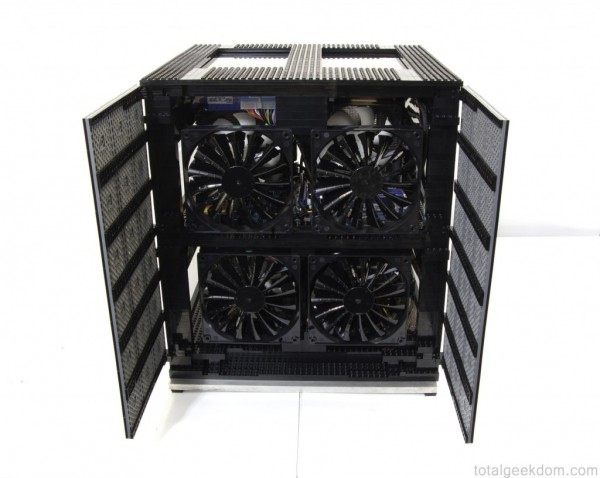Reader Mike Schropp sent in some pics of the CPU folding farm he built, complete with custom Lego case. As cool as having a Lego case is, though, the real purpose of the build is even better:
Around the time I began my planning I beginning to be involved in Grid Computing. I liked being able to use one of my geek hobbies in a way to help try and benefit others. Grid Computing allows for using your home computer (through the addition of a small free downloadable program) to use its CPU and or GPU for the purpose of processing data in the form of research problems, equations, and more. Normally, it takes a supercomputer days, weeks, or months to works its way through some of this research. Grid Computing leverages the power of hundreds of thousands of computers whose users donate their processing time to make this happen.
Since I was going to be building a new computer anyway it seemed like the perfect time to maximize my build for Grid Computing (Crunching).
Schropp details the process of his folding farm build, complete with parts specs and a photo gallery, to the finished product you see above. In keeping with the original plan, the custom case houses three systems, composed of the following parts list:
3X Sandy Bridge 2600k CPUs
3x Thermaltake Frio Cpu Coolers
3X Asus P8P67 Micro atx motherboards
1x Antec 1200 HCP Power Supply
2x Corsair SSD (System 1/Workstation)
1x Mushkin SSD (System 2/Touchscreen)
1x WD HD (System 3/Folding Only)
3X DDR3 for each system
8x Aerocool 140mm Case Fans
1x Metric Crapload of Lego Bricks (Technically it was about 2,000pcs)
According to Schropp, the decision to build the case of Lego came when no available cases fit his vision for the project. And while planning and execution of building a sturdy case that doesn’t buckle under the weight of the systems components or fall apart was a complicated one, the finished build is a thing of beauty–clean, functional, and strong. And most importantly, it’s a contribution to medical research and humanitarian projects, which makes it a machine worth infinitely more than the sum of its parts.
Check out the entire process on Total Geekdom. Way to go, Mike, and thanks for sharing!





